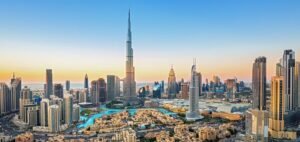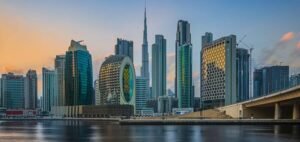Dubai, the dazzling metropolis of the United Arab Emirates (UAE), has transformed from a modest desert trading post into one of the world’s foremost business hubs. Its meteoric rise over the past few decades has captivated global attention, making it a case study in strategic vision, innovation, and resilience. Further, we inspect the key factors that contributed to Dubai’s emergence as a global business hub, drawing lessons and insights that can be applied to other regions and businesses seeking similar success.
Strategic Vision and Leadership
The foundation of Dubai’s success lies in its visionary leadership and strategic planning. The emirate’s rulers, particularly Sheikh Mohammed bin Rashid Al Maktoum, have played a pivotal role in shaping its growth trajectory. From the early 2000s, Dubai’s leadership set ambitious goals to diversify the economy beyond oil dependency, focusing on becoming a global center for trade, tourism, and finance.
Key Insight: Visionary leadership that anticipates future trends and invests in long-term planning is crucial for economic transformation. Dubai’s leaders had the foresight to invest in infrastructure, technology, and innovation, setting a clear roadmap for the city’s development.
Strategic Location and Infrastructure Development
Dubai’s strategic location at the crossroads of Europe, Asia, and Africa has been instrumental in its rise as a global business hub. Its proximity to major markets has made it an attractive destination for multinational companies looking to establish a foothold in the Middle East and beyond.
The development of world-class infrastructure, including the Dubai International Airport, one of the busiest airports globally, and the Jebel Ali Port, one of the largest man-made harbors, has further enhanced Dubai’s connectivity. The emirate’s modern road networks, skyscrapers, and business districts like Dubai International Financial Centre (DIFC) and Dubai Internet City have created a conducive environment for business operations.
Key Insight: Investing in strategic infrastructure and leveraging geographical advantages can significantly boost a city’s attractiveness as a business destination. Well-planned infrastructure supports efficient logistics, enhances connectivity, and provides a solid foundation for business activities.
Economic Diversification and Business-Friendly Policies
Dubai’s economy is characterized by its diversification away from oil dependency. The emirate has successfully developed sectors such as tourism, real estate, finance, and technology. Iconic projects like the Burj Khalifa, Palm Jumeirah, and Dubai Marina have not only attracted tourists but also investors seeking lucrative opportunities in real estate and hospitality.
Moreover, Dubai has implemented business-friendly policies that facilitate entrepreneurship and investment. Initiatives such as free zones, which offer tax exemptions and full foreign ownership, have been instrumental in attracting international businesses. The Dubai Chamber of Commerce and Industry and the Dubai Investment Development Agency have also played active roles in supporting business growth.
Key Insight: Economic diversification and the implementation of business-friendly policies can create a robust and resilient economy. Offering incentives, reducing bureaucratic hurdles, and fostering an entrepreneurial environment encourage investment and innovation.
Embracing Innovation and Technology
Dubai’s commitment to innovation and technology has been a cornerstone of its growth strategy. The city has embraced emerging technologies and digital transformation, positioning itself as a leader in smart city initiatives. The Dubai Smart City project aims to integrate technology into every aspect of urban life, from transportation and healthcare to governance and sustainability.
Dubai has also focused on becoming a global hub for fintech and technology startups. Initiatives like the Dubai Future Foundation and the Dubai Blockchain Strategy aim to position the emirate at the forefront of technological advancements. The presence of technology giants and innovative startups in Dubai underscores its role as a tech hub.
Key Insight: Embracing innovation and technology can drive growth and competitiveness. Cities and businesses that invest in digital transformation and foster a culture of innovation are better positioned to adapt to changing market dynamics and seize new opportunities.
Building a Global Brand
Dubai’s success in building a global brand is evident through its distinctive landmarks, world-class events, and strategic marketing. The city’s iconic skyline, luxury lifestyle, and high-profile events such as the Dubai Shopping Festival and Expo 2020 have reinforced its image as a premier global destination.
Dubai’s branding efforts have extended to sectors such as tourism and real estate, with global marketing campaigns showcasing the emirate’s attractions and investment potential. The city’s reputation as a center of luxury, innovation, and business excellence has attracted global attention and investment.
Key Insight: Building a strong global brand involves creating a distinctive identity and leveraging marketing to promote it. Cities and businesses that effectively brand themselves can attract international interest, enhance their reputation, and drive economic growth.
Conclusion
Dubai’s transformation into a global business hub offers valuable lessons and insights for other regions and businesses seeking to achieve similar success. Visionary leadership, strategic infrastructure development, economic diversification, and a commitment to innovation have been key drivers of Dubai’s growth. By embracing technology, building a strong global brand, cultivating a diverse talent pool, and focusing on sustainability, Dubai has positioned itself as a leading destination for business and investment.





